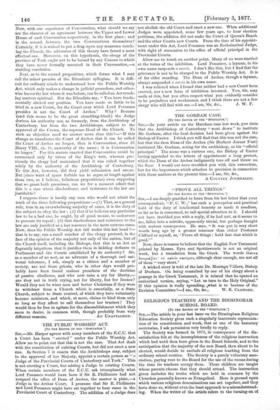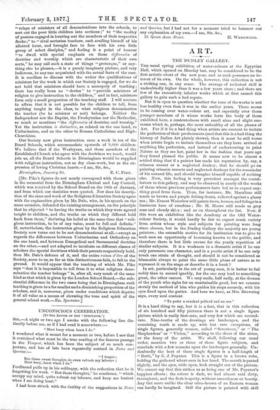RELIGIOUS TEACHING AND THE BIRMINGHAM SCHOOL BOARD.
[TO THE EDITOR OF THE 'SPECTATOR.")
SIR,—The article in your last issue on the Birmingham Religious Education Society gives such a singularly inaccurate representa- tion of its constitution and work, that as one of the honorary secretaries, I ask permission very briefly to reply.
The Society was formed in 1873, in consequence of the dis- satisfaction felt at the incompleteness of the religious instruction which had until then been given in the Board Schools, and to the anticipation that the majority of the new Board, then about to be elected, would decide to exclude all religious teaching from the ordinary school routine. The Society is a purely voluntary asso- ciation, paying rent to the Board for the use of the rooms during the time its teachers occupy them. Those children are taught whose parents choose that they should attend. The instruction given includes the truths which are held in common by the Churches generally known as Evangelical. Here is ground upon which various religious denominations can act together, and they have done so, without even the least approach to a misunderstand- ing. When the writer of the article refers to the turning-on of "relays of ministers of all denominations into the schools, to sort out the poor little children into sections ;" to "the medley of pastors engaged in hunting out the members of their respective flocks ;" to "rival sectarian teachers, each availing himself of his allotted hour, and brought face to face with his own little group of select disciples," and feeling it a point of honour "to dwell with special emphasis on those differentite of doctrine and worship which are characteristic of their own sects," he may call such a state of things "grotesque," or any- thing else he pleases,—it is a purely imaginary picture, and very ludicrous, to any one acquainted with the actual facts of the case. It is needless to discuss with the writer the qualifications of ministers for the work in which our Society is engaged, for we do not hold that ministers should have a monopoly of teaching ; there has really been no " device " to "provide ministers of religion to give instruction to the children," and in fact, ministers form only a small proportion of the teaching staff. I will venture to affirm that it is not possible for the children to tell, from anything taught in the class, to what religious denomination the teacher (be he minister or not) belongs. Neither the Independent nor the Baptist, the Presbyterian nor the Methodist, so much as mentions "the differentite of doctrine and worship." Yet the instruction is distinctive, as related on the one hand, to Unitarianism, and on the other to Roman Catholicism and High- Churchism.
Our Society now gives instruction once a week in ten of the Board Schools, which accommodate upwards of 9,000 children. We believe that if the Wesleyans, and those members of the Established Church who agree with the doctrines we teach, would join us, all the Board Schools in Birmingham would be supplied with religious instruction, not as dry class-work, but as the ex- pression of loving Christian hearts.—I am, Sir, &c.,
[Mr. Pike's figures do not nearly correspond with those given in the memorial from the Birmingham Clerical and Lay Council, which was received by the School Board on the 18th of January, and from which our statistics were quoted. Nor does his descrip- tion of the aims and work of the Religious Education Society agree with the explanation given by Mr. Dale, who, in his speech on the same occasion, defended the existing arrangement, on the principle that he objected "to having the truths on which they were agreed taught to children, and the truths on which they differed held back from them," declaring his belief at the same time that "reli- gious instruction, to be of any value, must be full and definite." If, nevertheless,-the instruction given by the Religious Education Society now turns out to be not denominational at all,—except as regards the differences between Unitarianism and Orthodoxy on the one hand, and between Evangelical and Sacramental doctrine on the other,—and not adapted to inculcate on different classes of scholars the special doctrines which their parents respectively hold, then Mr. Dale's defence of it, and the entire raison d'être of the Society, seem to us, so far as this distinctiveness fails, to fall to the ground. It would appear that the teaching of which Mr. Pike says "that it is impossible to tell from it to what religious deno- mination the teacher belongs" is, after all, very much of the same kind as that which is given by the London School Board,—the sub- stantial difference in the two cases being that in Birmingham such teaching is given to a far smaller and a diminishing proportion of the scholars, and is, moreover, given under conditions which deprive rt of all value as a means of elevating the tone and spirit of the general school work.—En. Spectator.]







































 Previous page
Previous page